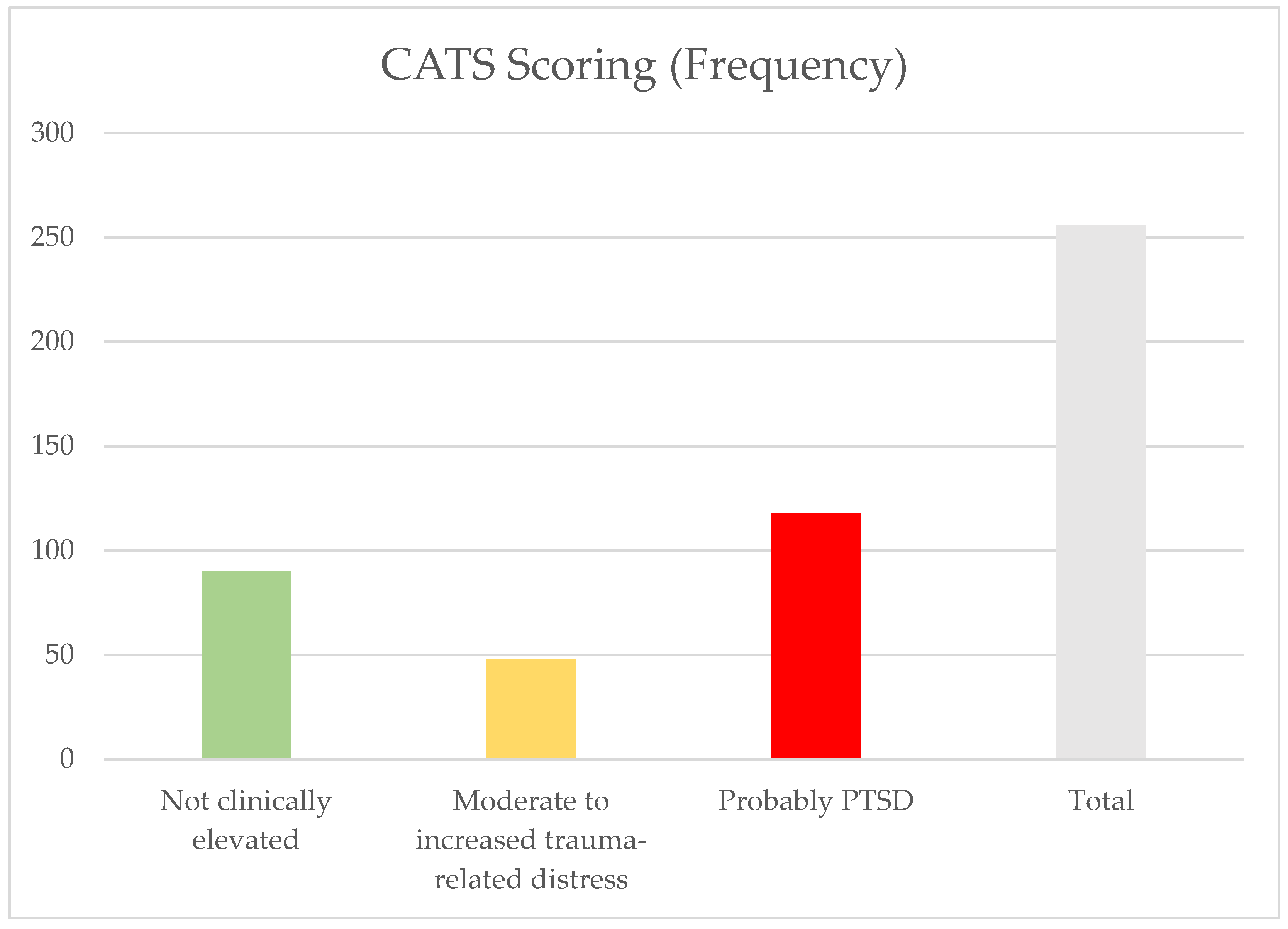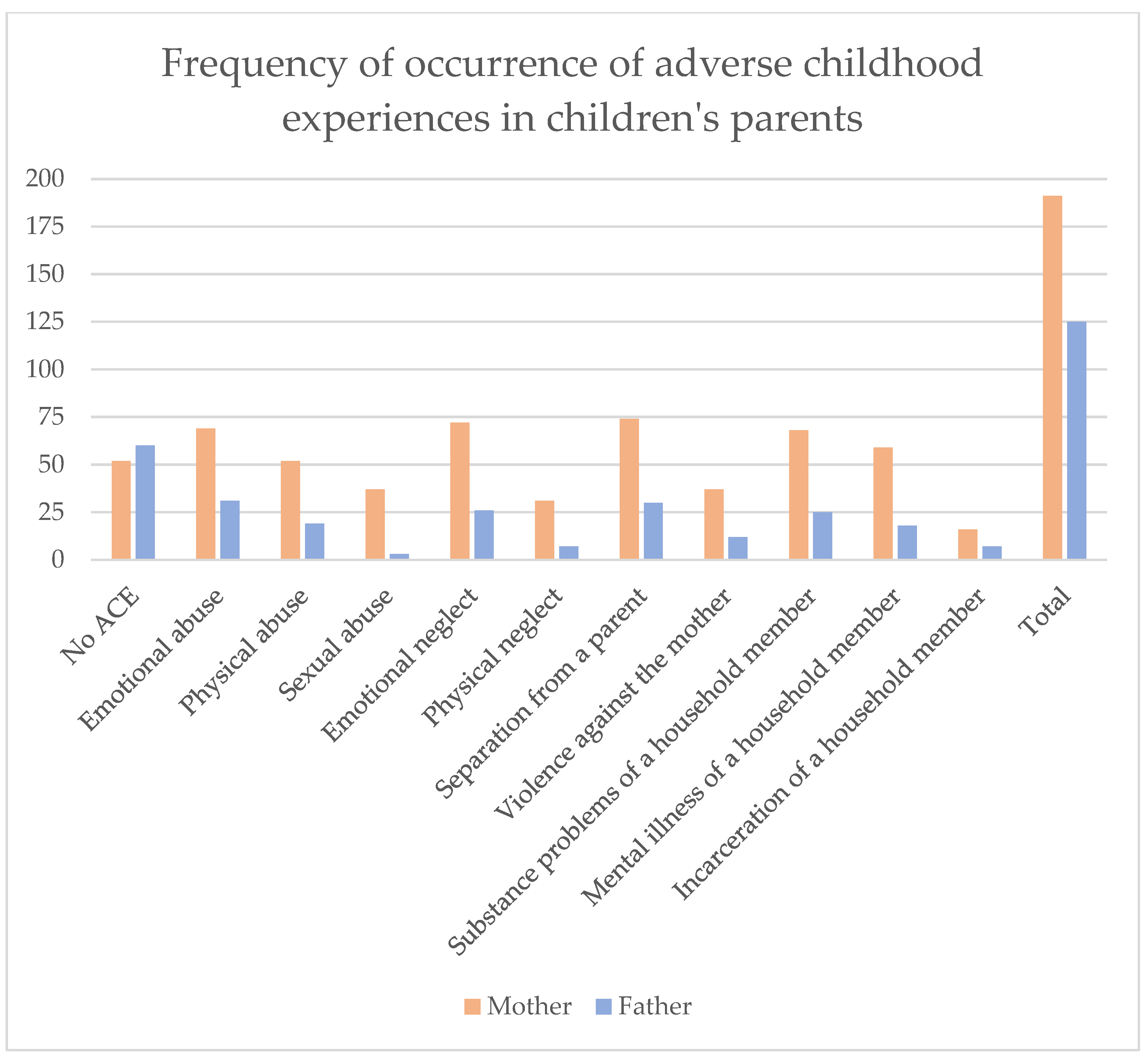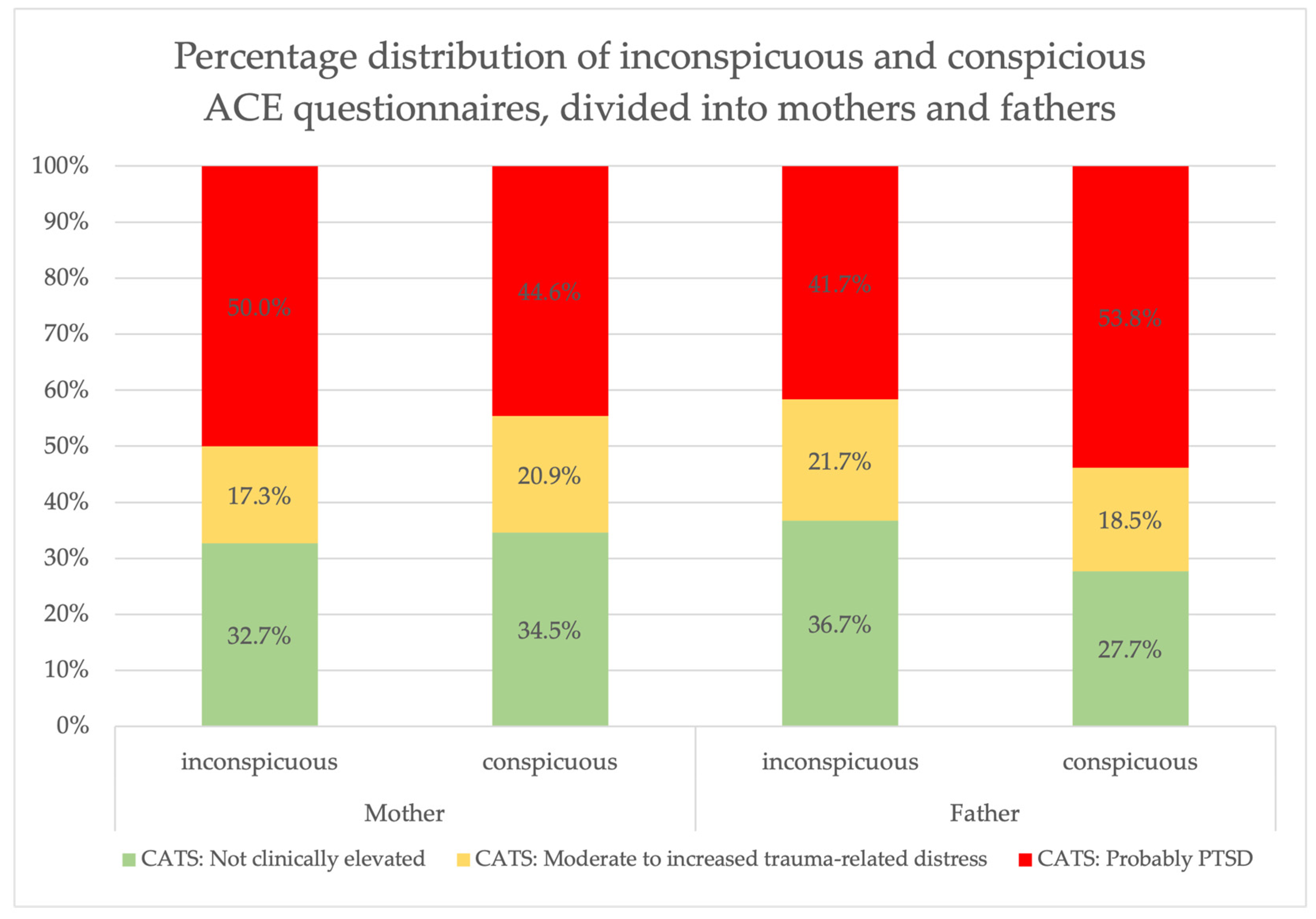Parents of Child Psychiatric Patients Report More Adverse Childhood Experiences Compared with Community Samples
Abstract
1. Introduction
2. Materials and Methods
3. Results
4. Discussion
5. Limitations
Author Contributions
Funding
Institutional Review Board Statement
Informed Consent Statement
Data Availability Statement
Acknowledgments
Conflicts of Interest
References
- Hawes, D.J.; Allen, J.L. A Developmental Psychopathology Perspective on Adverse Childhood Experiences (ACEs): Introduction to the Special Issue. Res. Child. Adolesc. Psychopathol. 2023, 51, 1715–1723. [Google Scholar] [CrossRef] [PubMed]
- Cicchetti, D.; Toth, S.L. Child Maltreatment. In Handbook of Child Psychology and Developmental Science; Lerner, R.M., Ed.; Wiley: Hoboken, NJ, USA, 2015; pp. 1–51. ISBN 978-1-118-13685-0. [Google Scholar]
- Pereda, N.; Guilera, G.; Forns, M.; Gómez-Benito, J. The prevalence of child sexual abuse in community and student samples: A meta-analysis. Clin. Psychol. Rev. 2009, 29, 328–338. [Google Scholar] [CrossRef] [PubMed]
- Kairys, S.W.; Johnson, C.F. Committee on Child Abuse and Neglect The Psychological Maltreatment of Children—Technical Report. Pediatr. 2002, 109, e68. [Google Scholar] [CrossRef] [PubMed]
- Miller, N.E.; Lacey, R.E. Childhood adversity and cardiometabolic biomarkers in mid-adulthood in the 1958 British birth cohort. SSM-Popul. Health 2022, 19, 101260. [Google Scholar] [CrossRef]
- Felitti, V.J.; Anda, R.F.; Nordenberg, D.; Williamson, D.F.; Spitz, A.M.; Edwards, V.; Koss, M.P.; Marks, J.S. Relationship of Childhood Abuse and Household Dysfunction to Many of the Leading Causes of Death in Adults. Am. J. Prev. Med. 1998, 14, 245–258. [Google Scholar] [CrossRef]
- Myers, M.; Gumusoglu, S.; Brandt, D.; Stroud, A.; Hunter, S.K.; Vignato, J.; Nuckols, V.; Pierce, G.L.; Santillan, M.K.; Santillan, D.A. A role for adverse childhood experiences and depression in preeclampsia. J. Clin. Trans. Sci. 2024, 8, e25. [Google Scholar] [CrossRef]
- Zhang, L.; Mersky, J.P.; Gruber, A.M.H.; Kim, J.-Y. Intergenerational Transmission of Parental Adverse Childhood Experiences and Children’s Outcomes: A Scoping Review. Trauma. Violence Abus. 2023, 24, 3251–3264. [Google Scholar] [CrossRef]
- Kolassa, I.-T.; Schury, K. Biological memory of childhood maltreatment-current knowledge and recommendations for future research. Ann. N. Y. Acad. Sci. 2012, 1262, 93–100. [Google Scholar] [CrossRef]
- Moehler, E.; Biringen, Z.; Poustka, L. Emotional availability in a sample of mothers with a history of abuse. Am. J. Orthopsychiatry 2007, 77, 624–628. [Google Scholar] [CrossRef]
- Skjothaug, T.; Smith, L.; Wentzel-Larsen, T.; Moe, V. Prospective fathers’ adverse childhood experiences, pregnancy-related anxiety, and depression during pregnancy: Prospective Fathers’ Adverse Childhood Experiences. Infant. Ment. Health J. 2015, 36, 104–113. [Google Scholar] [CrossRef]
- Walper, S.; Ulrich, S.M.; Kindler, H. Familiale Belastungsfaktoren für die emotionale Entwicklung junger Kinder. Bundesgesundheitsbl 2023, 66, 717–726. [Google Scholar] [CrossRef] [PubMed]
- Bürgin, D.; Clemens, V.; Witt, A.; Sachser, C.; Jud, A.; Brähler, E.; Strauß, B.; Petrowski, K.; Schmid, M.; Fegert, J.M. Adverse childhood experiences increase the risk for low perceived social participation and health-related quality of life in a large-scale population-based study in Germany. Child. Abus. Negl. 2023, 144, 106382. [Google Scholar] [CrossRef] [PubMed]
- Ruf-Leuschner, M.; Roth, M.; Schauer, M. Traumatisierte Mütter–traumatisierte Kinder? Eine Untersuchung des transgenerationalen Zusammenhangs von Gewalterfahrungen und Traumafolgestörungen in Flüchtlingsfamilien. Z. Für Klin. Psychol. Und Psychother. 2014, 43, 1–16. [Google Scholar] [CrossRef]
- Wingenfeld, K.; Schäfer, I.; Terfehr, K.; Grabski, H.; Driessen, M.; Grabe, H.; Löwe, B.; Spitzer, C. Reliable, valide und ökonomische Erfassung früher Traumatisierung: Erste psychometrische Charakterisierung der deutschen Version des Adverse Childhood Experiences Questionnaire (ACE). Psychother. Psych. Med. 2011, 61, e10–e14. [Google Scholar] [CrossRef]
- Oláh, B.; Fekete, Z.; Kuritárné Szabó, I.; Kovács-Tóth, B. Validity and reliability of the 10-Item Adverse Childhood Experiences Questionnaire (ACE-10) among adolescents in the child welfare system. Front. Public Health 2023, 11, 1258798. [Google Scholar] [CrossRef]
- Sachser, C.; Berliner, L.; Risch, E.; Rosner, R.; Birkeland, M.S.; Eilers, R.; Hafstad, G.S.; Pfeiffer, E.; Plener, P.L.; Jensen, T.K. The child and Adolescent Trauma Screen 2 (CATS-2)-validation of an instrument to measure DSM-5 and ICD-11 PTSD and complex PTSD in children and adolescents. Eur. J. Psychotraumatol 2022, 13, 2105580. [Google Scholar] [CrossRef]
- Sachser, C.; Berliner, L.; Holt, T.; Jensen, T.K.; Jungbluth, N.; Risch, E.; Rosner, R.; Goldbeck, L. International development and psychometric properties of the Child and Adolescent Trauma Screen (CATS). J. Affect. Disord. 2017, 210, 189–195. [Google Scholar] [CrossRef]
- Ulmer Onlineklinik. Available online: https://ulmer-onlineklinik.de/course/view.php?id=666 (accessed on 1 October 2024).
- Suhail Usmani, S.; Mehendale, M.; Yousif Shaikh, M.; Sudan, S.; Guntipalli, P.; Ouellette, L.; Sajid Malik, A.; Siddiqi, N.; Walia, N.; Shah, K.; et al. Understanding the Impact of Adverse Childhood Experiences on Non-suicidal Self-Injury in Youth: A Systematic Review. Alpha Psychiatry 2024, 25, 150–164. [Google Scholar] [CrossRef]
- Witt, A.; Sachser, C.; Plener, P.L.; Brähler, E.; Fegert, J.M. The Prevalence and Consequences of Adverse Childhood Experiences in the German Population. Dtsch. Ärzteblatt Int. 2019, 116, 0635. [Google Scholar] [CrossRef]
- Witt, A.; Brown, R.; Plener, P.L.; Brähler, E.; Fegert, J.M.; Clemens, V. Kindesmisshandlung und deren Langzeitfolgen–Analyse einer repräsentativen deutschen Stichprobe. Z. Für Psychiatr. Psychol. Und Psychother. 2019, 67, 100–111. [Google Scholar] [CrossRef]
- Hughes, K.; Bellis, M.A.; Hardcastle, K.A.; Sethi, D.; Butchart, A.; Mikton, C.; Jones, L.; Dunne, M.P. The effect of multiple adverse childhood experiences on health: A systematic review and meta-analysis. Lancet Public Health 2017, 2, e356–e366. [Google Scholar] [CrossRef] [PubMed]
- Marysko, M.; Reck, C.; Mattheis, V.; Finke, P.; Resch, F.; Moehler, E. History of Childhood Abuse Is Accompanied by Increased Dissociation in Young Mothers Five Months Postnatally. Psychopathology 2010, 43, 104–109. [Google Scholar] [CrossRef] [PubMed]
- Möhler, E.; Matheis, V.; Poustka, L.; Marysko, M.; Finke, P.; Kaufmann, C.; Reck, C.; Cierpka, M.; Resch, F. Mothers with a history of abuse tend to show more impulsiveness. Child. Abus. Negl. 2009, 33, 123–126. [Google Scholar] [CrossRef] [PubMed]
- Möhler, E.; Matheis, V.; Marysko, M.; Finke, P.; Kaufmann, C.; Cierpka, M.; Reck, C.; Resch, F. Complications during pregnancy, peri- and postnatal period in a sample of women with a history of child abuse. J. Psychosom. Obstet. Gynecol. 2008, 29, 197–202. [Google Scholar] [CrossRef]
- Neukel, C.; Bertsch, K.; Fuchs, A.; Zietlow, A.-L.; Reck, C.; Moehler, E.; Brunner, R.; Bermpohl, F.; Herpertz, S.C. The maternal brain in women with a history of early-life maltreatment: An imagination-based fMRI study of conflictual versus pleasant interactions with children. J. Psychiatry Neurosci. 2018, 43, 273–282. [Google Scholar] [CrossRef]
- Neukel, C.; Herpertz, S.C.; Hinid-Attar, C.; Zietlow, A.-L.; Fuchs, A.; Moehler, E.; Bermpohl, F.; Bertsch, K. Neural processing of the own child’s facial emotions in mothers with a history of early life maltreatment. Eur. Arch. Psychiatry Clin. Neurosci. 2019, 269, 171–181. [Google Scholar] [CrossRef]
- Mielke, E.L.; Neukel, C.; Bertsch, K.; Reck, C.; Möhler, E.; Herpertz, S.C. Maternal sensitivity and the empathic brain: Influences of early life maltreatment. J. Psychiatr. Res. 2016, 77, 59–66. [Google Scholar] [CrossRef]
- Tognin, S.; Catalan, A.; Modinos, G.; Kempton, M.J.; Bilbao, A.; Nelson, B.; Pantelis, C.; Riecher-Rössler, A.; Bressan, R.; Barrantes-Vidal, N.; et al. Emotion Recognition and Adverse Childhood Experiences in Individuals at Clinical High Risk of Psychosis. Schizophr. Bull. 2020, 46, 823–833. [Google Scholar] [CrossRef]
- Schneider, I.; Neukel, C.; Bertsch, K.; Fuchs, A.; Möhler, E.; Zietlow, A.-L.; Brunner, R.; Wolf, R.C.; Herpertz, S.C. Early life maltreatment affects intrinsic neural function in mothers. J. Psychiatr. Res. 2021, 143, 176–182. [Google Scholar] [CrossRef]





| Variable | n or M |
|---|---|
| Age (M, SD) | 13.26 (2.73) |
| Sex (n, %) | |
| Male | 67 (26.2) |
| Female | 189 (73.8) |
| Country of Origin (n, %) | |
| America | 1 (0.4) |
| Bulgaria | 1 (0.4) |
| Germany | 240 (94.9) |
| Malaysia | 1 (0.4) |
| Poland | 1 (0.4) |
| Romania | 1 (0.4) |
| Russia | 1 (0.4) |
| Syria | 3 (1.2) |
| Ukraine | 3 (1.2) |
| Venezuela | 1 (0.4) |
| Native Language (n, %) | |
| Arabic | 3 (1.2) |
| German | 240 (93.8) |
| English | 2 (0.8) |
| Italian | 1 (0.4) |
| Polish | 2 (0.8) |
| Portuguese | 1 (0.4) |
| Romanian | 1 (0.4) |
| Russian | 2 (0.8) |
| Spanish | 1 (0.4) |
| Ukrainian | 2 (0.8) |
| Urdu | 1 (0.4) |
| Diagnoses | ICD-10 | Frequency (n) | Percent (%) |
|---|---|---|---|
| Mental and behavioral disorders due to use of alcohol, harmful use | F10.1 | 1 | 0.4 |
| Acute polymorphic psychotic disorder with symptoms of schizophrenia | F23.1 | 1 | 0.4 |
| Moderate depressive episode | F32.1 | 45 | 17.6 |
| Severe depressive episode without psychotic symptoms | F32.2 | 1 | 0.4 |
| Agoraphobia: with panic disorder | F40.01 | 2 | 0.8 |
| Social phobias | F40.1 | 6 | 2.3 |
| Specific (isolated) phobias | F40.2 | 2 | 0.8 |
| Panic disorder | F41.0 | 1 | 0.4 |
| Generalized anxiety disorder | F41.1 | 3 | 1.2 |
| Mixed anxiety and depressive disorders | F41.2 | 5 | 2.0 |
| Mixed obsessional thoughts and acts | F42.2 | 1 | 0.4 |
| Acute stress reaction | F43.0 | 4 | 1.6 |
| Post-traumatic stress disorder | F43.1 | 75 | 29.3 |
| Adjustment disorders | F43.2 | 40 | 15.6 |
| Other reactions to severe stress | F43.8 | 1 | 0.4 |
| Mixed dissociative (conversion) disorders | F44.7 | 1 | 0.4 |
| Anorexia nervosa | F50.0 | 5 | 2.0 |
| Anorexia nervosa, active type | F50.01 | 2 | 0.8 |
| Atypical anorexia nervosa | F50.1 | 1 | 0.4 |
| Eating disorder, unspecified | F50.9 | 2 | 0.8 |
| Emotionally unstable personality disorder | F60.31 | 2 | 0.8 |
| Other habit and impulsive disorders | F63.8 | 1 | 0.4 |
| Trans-sexualism | F64.0 | 1 | 0.4 |
| Childhood autism | F84.0 | 1 | 0.4 |
| Asperger syndrome | F84.5 | 1 | 0.4 |
| Disorder of activity and attention | F90.0 | 6 | 2.3 |
| Hyperkinetic conduct disorder | F90.1 | 8 | 3.1 |
| Conduct disorder confined to the family context | F91.0 | 1 | 0.4 |
| Unsocialized conduct disorder | F91.1 | 1 | 0.4 |
| Socialized conduct disorder | F91.2 | 1 | 0.4 |
| Oppositional defiant disorder | F91.3 | 4 | 1.6 |
| Other mixed disorders of conduct and emotions | F92.8 | 2 | 0.8 |
| Separation anxiety disorder of childhood | F93.0 | 1 | 0.4 |
| Phobic anxiety disorder of childhood | F93.1 | 2 | 0.8 |
| Other childhood emotional disorders | F93.8 | 15 | 5.9 |
| Elective mutism | F94.0 | 1 | 0.4 |
| Reactive attachment disorder of childhood | F94.1 | 1 | 0.4 |
| Disinhibited attachment disorder of childhood | F94.2 | 2 | 0.8 |
| Other childhood disorders of social functioning | F94.8 | 1 | 0.4 |
| Other specified behavioral and emotional disorders with onset usually occurring in childhood and adolescence | F98.8 | 1 | 0.4 |
| Attention deficit disorder without hyperactivity with onset usually occurring in childhood and adolescence | F98.80 | 2 | 0.8 |
| Other specified behavioral and emotional disorders with onset usually occurring in childhood and adolescence | F98.88 | 1 | 0.4 |
| Other problems related to lifestyle | Z72.8 | 1 | 0.4 |
| Diagnoses | Total Sample (n; %) | Mother | Father | ||
|---|---|---|---|---|---|
| Frequency (n) | Percent (%) | Frequency (n) | Percent (%) | ||
| ACE 1: emotional abuse | 100 (31.6) | 69 | 36.1 | 31 | 24.8 |
| ACE 2: physical abuse | 71 (22.5) | 52 | 27.2 | 19 | 15.2 |
| ACE 3: sexual abuse | 40 (12.7) | 37 | 19.4 | 3 | 2.4 |
| ACE 4: emotional neglect | 98 (31.0) | 72 | 37.7 | 26 | 20.8 |
| ACE 5: physical neglect | 38 (12.0) | 31 | 16.2 | 7 | 5.6 |
| ACE 6: parental divorce/separation | 104 (32.9) | 74 | 38.7 | 30 | 24.0 |
| ACE 7: witnessed domestic violence | 49 (15.5) | 37 | 19.4 | 12 | 9.6 |
| ACE 8: alcohol and drug abuse in the household | 93 (29.4) | 68 | 35.6 | 25 | 20.0 |
| ACE 9: mental illness in the household | 77 (24.4) | 59 | 30.9 | 18 | 14.4 |
| ACE 10: incarcerated family member | 23 (7.3) | 16 | 8.4 | 7 | 5.6 |
| Number of ACEs | Total Sample (n; %) | Mother | Father | ||
|---|---|---|---|---|---|
| Frequency (n) | Percent (%) | Frequency (n) | Percent (%) | ||
| 0 | 112 (35.4) | 52 | 27.2 | 60 | 48.0 |
| 1 | 56 (17.7) | 33 | 17.3 | 23 | 18.4 |
| 2 | 33 (10.4) | 21 | 11.0 | 12 | 9.6 |
| 3 | 34 (10.8) | 23 | 12.0 | 11 | 8.8 |
| ≥4 | 81 (25.6) | 62 | 32.5 | 19 | 15.2 |
Disclaimer/Publisher’s Note: The statements, opinions and data contained in all publications are solely those of the individual author(s) and contributor(s) and not of MDPI and/or the editor(s). MDPI and/or the editor(s) disclaim responsibility for any injury to people or property resulting from any ideas, methods, instructions or products referred to in the content. |
© 2024 by the authors. Licensee MDPI, Basel, Switzerland. This article is an open access article distributed under the terms and conditions of the Creative Commons Attribution (CC BY) license (https://creativecommons.org/licenses/by/4.0/).
Share and Cite
Altpeter, A.; Dixius, A.; Möhler, E. Parents of Child Psychiatric Patients Report More Adverse Childhood Experiences Compared with Community Samples. Children 2024, 11, 1427. https://doi.org/10.3390/children11121427
Altpeter A, Dixius A, Möhler E. Parents of Child Psychiatric Patients Report More Adverse Childhood Experiences Compared with Community Samples. Children. 2024; 11(12):1427. https://doi.org/10.3390/children11121427
Chicago/Turabian StyleAltpeter, Adriana, Andrea Dixius, and Eva Möhler. 2024. "Parents of Child Psychiatric Patients Report More Adverse Childhood Experiences Compared with Community Samples" Children 11, no. 12: 1427. https://doi.org/10.3390/children11121427
APA StyleAltpeter, A., Dixius, A., & Möhler, E. (2024). Parents of Child Psychiatric Patients Report More Adverse Childhood Experiences Compared with Community Samples. Children, 11(12), 1427. https://doi.org/10.3390/children11121427







